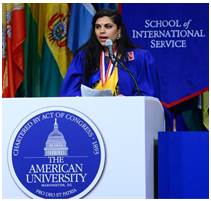Editor’s Note: Priyanka Srinivasa grew up in Murrysville, PA, an Eastern Suburb of Pittsburgh. She graduated this year earning her bachelor’s degree with Magna Cum Laude from the American University’s School of International Service (SIS). She was the speaker during the graduation ceremonies at SIS. Here is the major portion of her speech. Priyanka can be reached at ps7316a@student.american.edu
 “I came to SIS — the School of International Studies — at American University with goals of developing the professional skills I needed to represent a Hindu voice in US Foreign policy. But in a region like South Asia with thousands of years of civilization, conquest, colonialism, and Partition, history is complex. Whose story was I telling? Who was I leaving behind? At the same time, I knew I was Indian and American.
“I came to SIS — the School of International Studies — at American University with goals of developing the professional skills I needed to represent a Hindu voice in US Foreign policy. But in a region like South Asia with thousands of years of civilization, conquest, colonialism, and Partition, history is complex. Whose story was I telling? Who was I leaving behind? At the same time, I knew I was Indian and American.
“As a member of a minority community in America, I was expected and pressured to represent this community. I felt torn between needing to represent my community and knowing what it meant to be a South Asian. How could I represent what I did not know? I was torn by feelings of responsibility and feelings of uncertainty.
“Feeling lost, I sought refuge when reading Todorov’s Conquest of America in Professor Patrick Thaddeus’ Jackson’s World Politics class. I read: “The man who finds his country sweet is only a raw beginner; the man for whom each country is as his own is already strong; but only the man for whom the whole world is as a foreign country is perfect.†This was so powerful — “The man for whom the whole world is as a foreign country is perfect.â€Â Foreigner, Videshi, Deconocido… Stranger. When a stranger encounters a strange land, she is forced to be humble…
“Being a stranger is not easy. Being a stranger requires that we accept not only uncertainty but also humility. During my sophomore year in Ambassador Akbar Ahmed’s “World of Islam†class, I had a fellow-student in the ROTC program who had a diametrically opposed world-view to my own. In class, we discussed the politics of identity in post-9-11 America. The subject matter was close to my heart because it was my living experience. In recent years, Sikh and Hindu communities in the US have suffered hate crimes — as a Hindu American I watched, and was horrified.
“Our conflicting views turned into an intense, explosive disagreement. We were both intransigent, locked into a conflict that rose from what we imagined the other to be. We could not hear each other …
“Quite suddenly I realized — just because I was talking to someone in a uniform, it did not mean I was talking to a uniform. The man underneath it was as dynamic and human as I am. We were not trying to solve our differences — we were confronting them.
“Pedagogical environments lead us to certain kinds of estrangement. SIS did not solve of my or anyone else’s identity. SIS helped me learn to dwell in the ambiguity of who we are. Estrangement does not have a fairy tale ending — an easy casting away of differences. Estrangement is… … confronting humanity of the ‘Other’ without dissolving his/her ‘Otherness’.â€
“SIS helped me recognize that humanity is not a collective singular, but a dynamic, organic, fervent, and beautiful force. I recognized humanity at SIS by going deeper and deeper into myself and by ‘confronting’ other views and minds. I was only able to do that when I became a stranger and questioned my initial identity and myself.
“So, go out and interrogate your worldview. What makes us, the SIS Students, is our ability to question…. The School educates students to recognize humanity through humility. The service we bring to the world is figuring out the questions for everyone to see, and that is enough.
“I have come to terms that perhaps I will not resolve my conflict of being an Indian, an American, and a Hindu… I have come to terms that this is my beginning. By studying my own identity, I have realized that I am a stranger. I have questions which I will spend the rest of my life figuring out.
“If there is one lesson I will give to you, it is this: Reject simple historical narratives. Reject it. Learn to be a stranger to it. It does not mean we have no heritage, no home, no identity. But it does mean we are not bound and constrained by the chains that ascribe us through guilt… My journey did not make me any less of a Hindu. My incessant questioning of identity makes even more proud to call myself a Hindu.
“Thank you, the Faculty at SIS, for spending countless hours cultivating our minds. Thank you, all my mentors for giving me the confidence to keep asking larger questions. Thank you, Amma and Appa — my mother and father — for trusting me to find my voice. I will not let you down. Thank you American University School of International Service for letting me tell my story.” ♦
